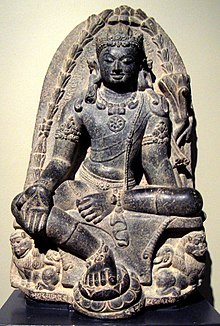Manjushri
| Transcriptions |
| Wylie |
'jam dpal dbyangs |
Mañjuśrī is a bodhisattva associated with prajñā (insight) in Mahayana Buddhism. In Tibetan Buddhism, he is also a yidam. His name means "Gentle Glory" in Sanskrit. Mañjuśrī is also known by the fuller name of Mañjuśrīkumārabhūta, literally "Mañjuśrī, Still a Youth" or, less literally, "Prince Mañjuśrī".
Scholars have identified Mañjuśrī as the oldest and most significant bodhisattva in Mahāyāna literature. Mañjuśrī is first referred to in early Mahayana sutras such as the Prajnaparamita sutras and through this association very early in the tradition he came to symbolize the embodiment of prajñā (transcendent wisdom). The Lotus Sutra assigns him a pure land called Vimala, which according to the Avatamsaka Sutra is located in the East. His pure land is predicted to be one of the two best pure lands in all of existence in all the past, present and future. When he attains buddhahood his name will be Universal Sight. In the Lotus Sūtra, Mañjuśrī also leads the Nagaraja's daughter to enlightenment. He also figures in the Vimalakirti Sutra in a debate with Vimalakirti.
An example of a wisdom teaching of Mañjuśrī can be found in the Saptaśatikā Prajñāpāramitā Sūtra (Taishō Tripiṭaka 232). This sūtra contains a dialogue between Mañjuśrī and the Buddha on the One Samadhi (Skt. Ekavyūha Samādhi). Sheng-yen renders the following teaching of Mañjuśrī, for entering samādhi naturally through transcendent wisdom:
Contemplate the five skandhas as originally empty and quiescent, non-arising, non-perishing, equal, without differentiation. Constantly thus practicing, day or night, whether sitting, walking, standing or lying down, finally one reaches an inconceivable state without any obstruction or form. This is the Samadhi of One Act (yixing sanmei, 一行三昧).
...
Wikipedia

